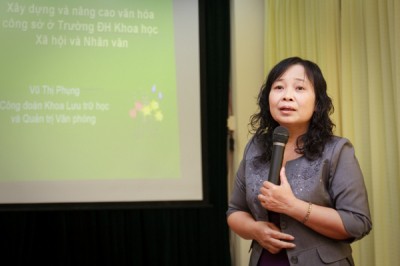Towards building an official regulation on workplace culture (CC) for the University, the Union of the University of Social Sciences and Humanities held a discussion on May 22, 2010 with the participation of representatives of departmental unions.This is an attractive and popular topic, demonstrated through more than 10 reports submitted to the discussion with many different approaches and contents reflecting the manifestations of office culture in schools. Answering the question "What is office culture?", Associate Professor, Dr. Vu Thi Phung (Department of Archival Science and Office Administration) gave the definition: "Office culture is the sum of tangible and intangible values, including the level of awareness, organization and management methods, environment - landscape, working facilities, professional ethics and communication style of civil servants to build a civilized, polite, legally operating and highly effective office". On that basis, the presentation proposed 4 criteria to measure the office culture of an agency including: the level of awareness of cadres and civil servants; the level and method of management and operation of the agency's activities; communication style and behavior of cadres and civil servants; landscape and working environment.

Discussing the role of office culture, the opinions expressed all agreed that building and improving office culture will contribute to building trust and consensus among staff, lecturers and students in improving the efficiency and quality of research and training; building the brand and ensuring the sustainable development of the school. Many opinions pointed out the limitations in the office culture of staff and students today such as: being late for meetings, talking privately during meetings, impolite behavior with guests and colleagues, inappropriate attire while working, unprofessional working style, lack of responsibility for assigned work... To improve office culture, opinions focused on solutions: promoting awareness of staff and students about the position, mission and social responsibility of the school; applying ISO standards to control and professionalize management activities; having policies and mechanisms to care about the lives of staff and civil servants; Focus on creating the image of the unit's working environment, building official regulations on school culture and ethics...

